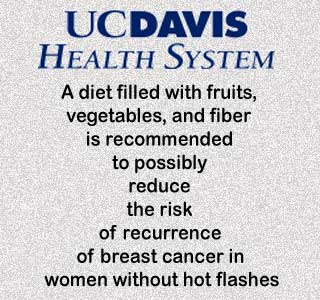
The study team consisted of researchers from the Moores Cancer Center at the University of California, San Diego, the University of California, Davis, and others. These findings are based on the outcome of the original study conducted earlier. The earlier study, the Women’s Healthy Eating and Living Trial (WHEL) evaluated the effects that the two diets had on cancer re-growth in early-stage breast cancer survivors. However, there was no significant difference noticed in both the diet groups.
WHEL principal investigator John P. Pierce, Ph.D., says that, “Our interest in looking at this subgroup came because hot flashes are associated with lower circulating estrogen levels, while the absence of hot flashes is associated with higher estrogen levels. Reducing the effect of estrogen is a major treatment strategy in breast cancer. It appears that a dietary pattern high in fruits, vegetables and fiber, which has been shown to reduce circulating estrogen levels, may only be important among women with circulating estrogen levels above a certain threshold.â€
Pierce further says that, there is, supposedly, another explanation as to why the proposed diet could affect only about 30 percent of the studied women in the WHEL study. He says women with estrogen receptor-positive cancers are apparently, often given hormone therapy in order to fight against the effect of the circulating estrogen. It is stated that, the mentioned 30 percent of women, seemed to have a gene-drug interaction that inhibited them from, evidently, getting a dose of this therapy.
Pierce says this assumption states that if the endocrine therapy is effective, then the estrogen levels need not be reduced. He continues that if the genes are coming in the way of the therapy dosage effect then, supposedly, the mentioned dietary pattern may aid in enough reduction of estrogen levels required to reduce the risk.
The study team is believed to analyze the biological samples accumulated throughout the study, in order to examine the, supposedly, protective effects of the mentioned diet.
Their findings are published online in the Journal of Clinical Oncology.
